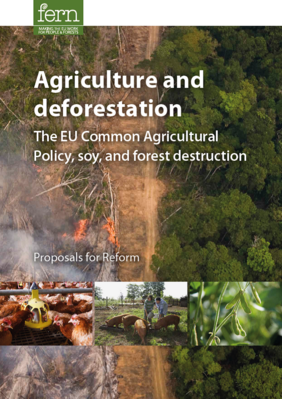European farmers rely on soy imports from Brazil, Argentina and Paraguay to use as animal feed, mostly for pigs and chicken but also for cattle, other farm animals and farmed fish. Soy production in these countries is clearly linked to large-scale deforestation, and soy imports to the EU comprise a large share of this production.
However, the current CAP does not directly incentivize production that leads to deforestation as there are no specific subsidies for imported feedstuffs. Nevertheless, parts of the CAP, such as the beef premium and market support measures related to animal products, clearly make these activities more attractive. On the other hand, the CAP offers few incentives for sustainable feed production and extensive livestock systems. As it is cheapest, farmers thus rely on soy imports from abroad and intensive livestock production based on concentrate feed.
A reformed CAP that abandons these specific payments could result in somewhat lower livestock production and a reduction in corresponding feed imports and the associated potential risk of deforestation.
However, more can be achieved by amending the CAP to make remaining support measures more sustainable. Such changes could make agricultural support dependent on reducing nitrogen surpluses, increasing animal health and welfare, and the efficient use of available resources. Such a policy would focus on measures that would lead to reduced incentives for intensive livestock production (e.g. internalisation of external costs or the support for grassland-based extensive production systems), thus leading to reduced demand for feed imports.
When focusing on reduced incentives for livestock production, it is however critical to also address demand. Otherwise, reduced production may just be replaced by increased imports of these products, thus relocating rather than eliminating the causes for deforestation. As long as consumers want high quantities of cheap animal products and as long as production is able to meet this demand, concentrate-based mass production of livestock will dominate. Lower consumption levels and a move towards a truly circular economy are thus critical to reduce deforestation linked to feed production.
Clear messages from the next CAP reform are thus needed on three levels:
- First, any measure that supports intensive livestock production systems that rely on imported feedstuff must be repealed. These systems cause deforestation and other impacts abroad, and add to the huge nitrogen oversupply in the EU.
- Second, remaining support measures should focus on grassland‐based livestock production systems and systems that use domestic waste and by‐products. Only then can agriculture operate within the bearing capacity of the EU environment.
- Third, the next CAP reform must take a clear step from an agricultural policy towards an integrated food policy, combining approaches that increase sustainability on the production side with approaches that target consumption. Less intensive and more extensive production without replacing it by direct imports is only possible if consumption patterns change towards lower levels of animal products and reduced food wastage.
Further information
Contact
Adrian Müller, FiBL Switzerland
Links
- fern.eu: Agriculture and deforestation
- fern.org: Full Report "Agriculture and Deforestation"





